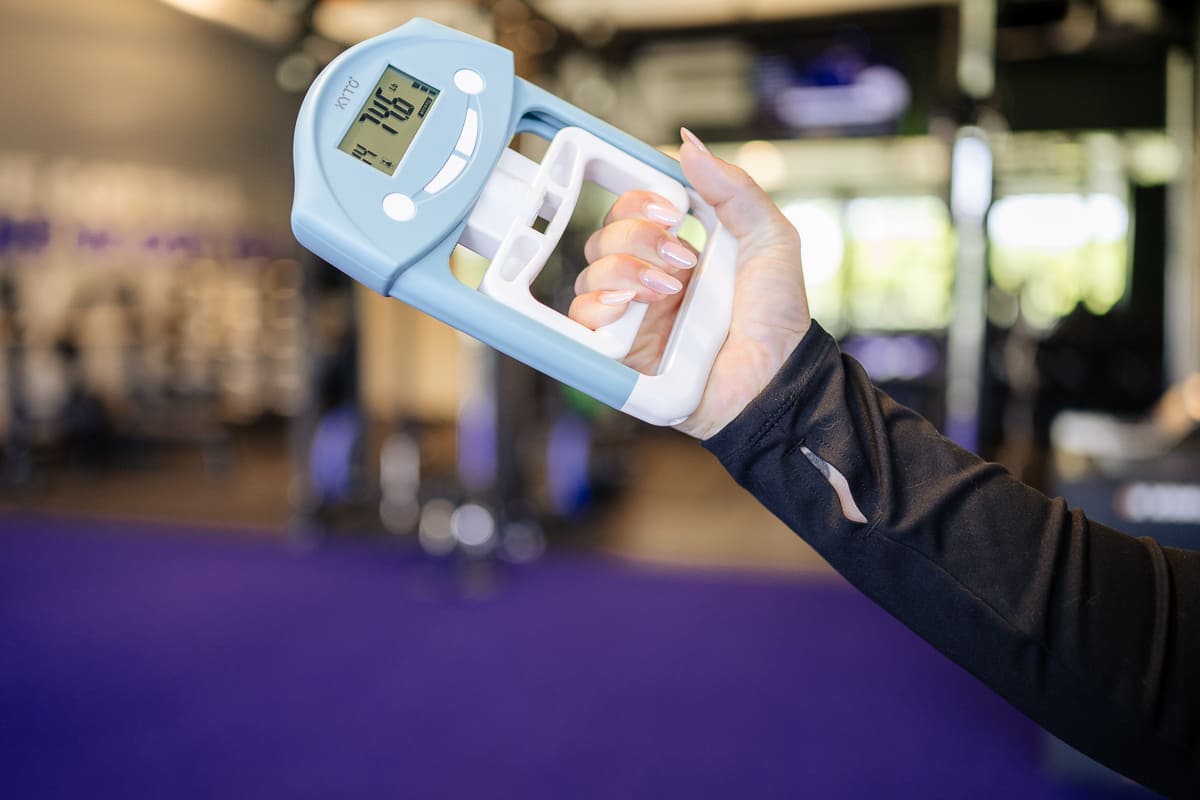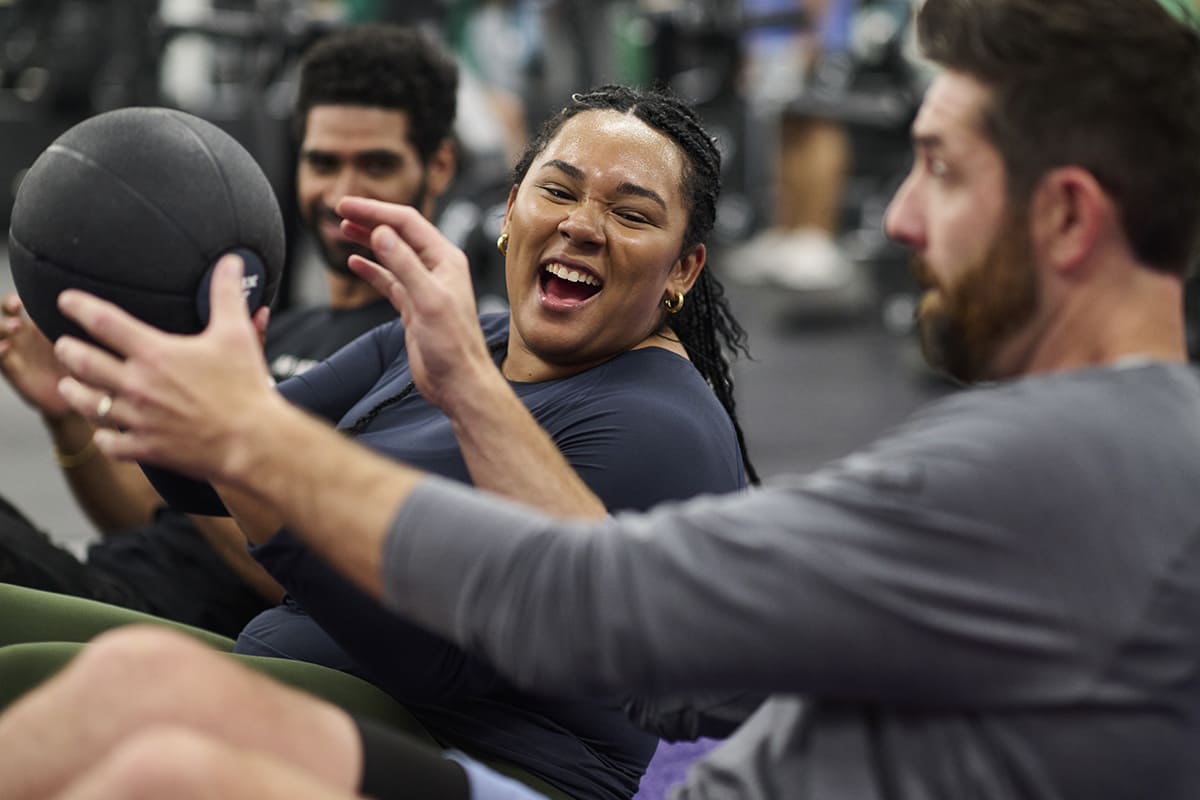You may already have a consistent routine after you finish a workout: stretch, shower, and get on with your day or evening. But did you know that eating certain foods after you’re done breaking a sweat can actually boost muscle recovery and help you see better results?
We’re exploring what to eat after exercise to boost muscle recovery with help from dietitian Sinan Ozyemisci, MS, RDN. Read on to discover the best foods for muscle recovery and how the fuel you choose can help — or hinder — all the great work you’re doing in the gym.
Why post-workout meals and nutrition matter
What you eat throughout the day affects the results you see at the gym; this is no surprise. But what you eat right after a workout is especially important, since post-exercise your body enters a prime state for rebuilding and repair. This window of opportunity doesn’t stay open long, which is why post-workout nutrition is so important.
“Proper nutrition following a workout provides your body with the essential nutrients at the optimal times to enhance your performance, provide energy, support muscle growth, and aid recovery,” Sinan says.
Eating the right muscle recovery foods — specifically the right mix of protein and carbohydrates — provides the building blocks your body needs to repair after exercise. It can help speed up muscle strain recovery, reduce soreness, and boost performance during your next workout — which can all help you reach your fitness goals faster.
Related: Overtraining Syndrome: What It Is and What You Need to Know
The role of protein and carbs in muscle recovery
Of the three macronutrients (protein, carbs, and fat), protein is the most essential for repairing and rebuilding muscle tissues that get broken down during exercise.
“Studies indicate that eating at least 30 grams of protein post-exercise maximizes muscle growth stimulation,” explains Sinan. However, if you have a ways to go before you’ll have time for a proper meal, it may be hard to cram 30 grams of protein into a simple snack.
The best strategy is to try and find a solid target of protein within 30–60 minutes of working out; and pairing your protein with a healthy target of carbs can take your recovery even further.
“Particularly after high-intensity or prolonged activities, studies show that the combination of protein and carbohydrates helps maximize muscle growth and stimulation,” says Sinan.
So, your mission, should you choose to accept it: Find a protein-rich option and pair it with a healthy target of carbs after you exercise, ideally within that 30–60 minute window of opportunity. While it may seem like a challenge, this magic combination isn’t necessarily hard to come by. It’s likely already a part of some of your favorite post-workout meals and snacks.
Related: 8 High-Protein Meal Ideas: Healthy Summer Recipes
What to eat after a workout: The 8 best foods for muscle recovery
So, what are the best muscle recovery foods to reach for in that post-exercise zone? Your best bet will depend on how far away you are from mealtime. If it will be a while before you can sit down to a full meal, opt for something on the lighter end of the spectrum, such as yogurt and berries. If dinner time is right around the corner, a full plate of chicken, sweet potatoes, and veggies is a better fit.
The following are all good post-workout foods and snacks to reach for in order to boost muscle recovery.
1. Greek yogurt with berries

Unlike regular yogurt, Greek yogurt is strained to remove whey, leaving a thicker consistency and more protein per serving. (One cup of Greek yogurt can deliver about 13 grams of protein!) It’s also a solid target of calcium, which is helpful in muscle rebuilding and bone health. Add some berries for carbohydrate-driven energy and a sprinkling of granola if you’re craving some extra crunch and sweetness.
2. Chocolate milk
Some things in life are too good to be true — but chocolate milk being an ideal post-workout snack isn’t one of them. Nutritionists and fitness pros have long proclaimed chocolate milk as one of the best foods for post-workout recovery, and for good reason: It boasts a near-perfect 3:1 or 4:1 ratio of carbohydrates to protein, which research suggests is optimal for muscle recovery.
The carbs found in chocolate milk are also readily absorbed by the body, which helps to replenish the glycogen stores depleted during your workout. Consider this one of the more delicious foods that help with muscle soreness and post-workout recovery.
3. Cottage cheese and fruit
Cottage cheese is another protein-packed dairy option; one cup offers roughly 25 grams of protein. It also boasts a specific type of protein — called casein — shown to be extra beneficial in muscle building. Pair with fruit such as pears or pineapple to make a quick and tasty post-workout snack.
(Bonus: Pineapple is loaded with a nutrient called bromelain, which boosts protein digestion and can help relieve pain from any injuries. This makes it one of the best — and tastiest! — foods that help with muscle soreness.)
4. Protein shake + banana
If you’re a long way from being able to sit down and enjoy a full meal, a simple shake can be a convenient way to get the protein your body needs to recover after exercise. Pair it with a banana for a target of easily digested carbs.
Plus, bananas boast a muscle-friendly combination of potassium and magnesium, which can prevent and relieve cramps. The fact that both of these snacks are perfectly portable makes it an even better combo for on-the-go recovery.
When you’re looking for a protein shake, just be sure to follow these guidelines:
- Understand the protein target. Whey protein is one of the most common targets; it contains all the essential amino acids and is typically easily digested by those who can tolerate dairy. Vegans may choose other targets like pea, pumpkin, or flaxseed.
- Check the amount of protein. Ideally, protein shakes close to or around 30g will be your best bet.
- Watch for added sweeteners. While many protein shakes contain ingredients like ry to avoid added sugar or dextrins/maltodextrins, which are sweeteners.
Tasty, protein-packed shakes to try
- Ditch the Drive-Thru: Protein Mint Smoothie
- Double Chocolate Chunk Protein Shake
- Protein-Packed Pina Kale-ada Smoothie
- Matcha Mango Protein Smoothie

5. Scrambled eggs on toast
It should come as no surprise that the humble egg would make the list of the best foods for post-workout recovery; as a complete protein, it contains all nine of the essential amino acids that your body needs. Two scrambled eggs provide about 12 grams of protein; use them to top a piece of whole wheat toast for a protein-carb combo that’s sure to satisfy while keeping muscle soreness at bay.
Related: 6 Healthy Grab-and-Go Breakfasts
6. Grilled chicken breast + sweet potatoes

There’s a reason chicken gets stereotyped as the go-to post-workout option for strength enthusiasts: It packs a lean, mean protein punch, averaging 28 grams of protein for every 3 ounce serving. Pair with a baked or roasted sweet potato for a healthy target of carbohydrates, as well as potassium for more muscle-recovery power.
Related: 9 Recipes That Confirm Our Obsession with Chicken
7. Fatty fish + quinoa
For meat-eaters and pescatarians, fatty fish such as salmon, sardines, and trout all make terrific post-workout meal choices. These types of fish are rich in protein and Omega-3 fats, which have been shown to reduce inflammation and can help your body recover from injuries. With just one 3.5-ounce serving of salmon, you get between 22 and 25 grams of protein.
Quinoa is another powerhouse food because it contains a healthy dose of both carbohydrates and protein. In fact, like eggs, quinoa is a complete protein, containing all nine essential amino acids your body needs for optimal recovery.
8. Grain bowls with beans or lentils

For vegetarians, finding good post-workout foods can sometimes be more challenging. Luckily, opting for a DIY grain bowl with brown rice or quinoa, beans or lentils, and veggies is a well-rounded option that will support muscle recovery. That’s because black beans boast roughly 15 grams of protein per cup; lentils offer nearly 18 grams. Paired with rice or quinoa for that carbohydrate-rich target of energy and topped with avocado, tomato, and cheese, you’ll create a homemade bowl with protein, carbs, fat and fiber to keep you full and satisfied.
Related: Recipe: Easy Flavor-Packed Greek Bowl
What foods hinder muscle recovery?
Now that you have a sense of good post-workout foods to try, what foods that hinder muscle recovery should you avoid eating? Sinan notes that moderation is always key when it comes to nutrition; while the occasional packaged snack or glass of wine is fine, if you’re always eating highly processed foods or have an excessive alcohol intake, it could sabotage your results.
Excessive alcohol
“Excessive alcohol consumption can disrupt sleep patterns, cause dehydration, and ultimately suppress protein synthesis in skeletal muscle following exercise,” says Sinan. “And highly processed foods may promote inflammation and oxidative stress, which could potentially impede muscle repair.”
Highly-processed foods
Highly-processed foods are often higher in calories and salt without a lot of protein.
“This ties into inadequate protein intake throughout the day,” says Sinan. “If we consume an unbalanced diet without prioritizing enough protein each day, we may put the efficiency of our muscle repair and growth at risk.”
Sugary drinks
We recommend avoiding post-workout drinks that have a lot of sugar, like soft drinks, as they can lead to energy crashes. Not to mention, sugary drinks have little to no nutritional benefits. A recent study even found that soft drinks can have a negative impact on kidney health when consumed during and after exercise.
A final look at nutrition and post-workout recovery

While eating right and choosing the best foods for muscle recovery is a huge part of the equation, it’s one piece of a larger puzzle. It’s important to remember that there are other factors that affect your body’s ability to repair itself after exercise, such as getting enough shut eye, limiting stress, and staying properly hydrated.
“The muscle recovery process depends on a variety of factors, including the lifestyle habits you have following the workout regimen,” says Sinan. “Things like sleep and stress factor into your recovery, too. And adequate hydration before, during, and after exercise is crucial to support energy levels and performance.”
Looking for more nutritious things to nosh on after you’re done at the gym? Try these Coach-approved post-workout snacks.



